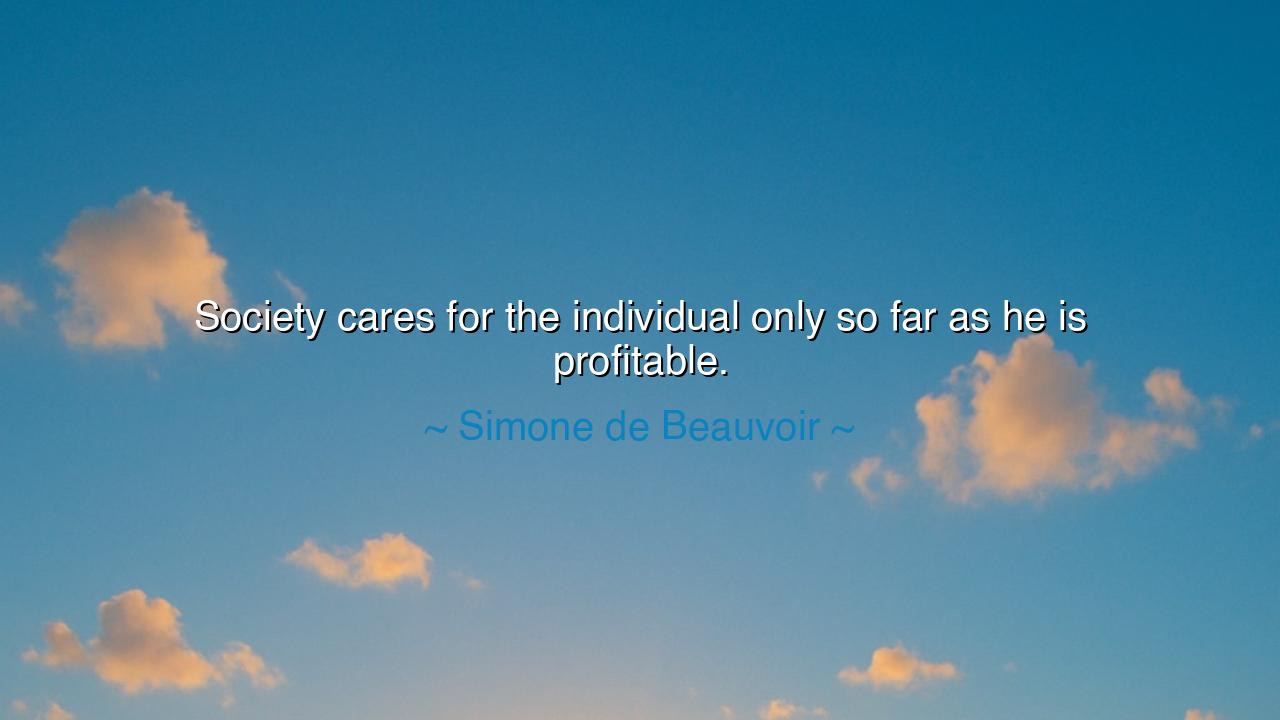
Society cares for the individual only so far as he is profitable.






Listen, O child of the future, to the cry of Simone de Beauvoir, the voice of fire who pierced the illusions of her age: “Society cares for the individual only so far as he is profitable.” These words cut like a sword through the veil of false concern, exposing the cold mechanism of human order. They reveal that beneath the soft garments of compassion, society often wears the iron armor of utility. It smiles at a man when he is useful, and forgets him when he ceases to yield gain. Such is the harsh truth, and yet in this truth lies a lesson of great power.
For behold: in the eyes of society, the individual is not cherished for his essence, but for his contribution. As long as a man produces wealth, strength, or service, he is celebrated; but when he falters, when he grows old, when his body or mind no longer feeds the great machine, he is cast aside like a tool worn beyond repair. This is not kindness, but transaction; not love, but exchange. Thus de Beauvoir speaks, unveiling a reality that has chained countless souls to despair.
History bears many witnesses to this truth. Consider the fate of the soldiers of Napoleon. While they marched under his banners, bringing victory and glory to the Empire, they were hailed as heroes, adorned with medals and praise. But when they returned crippled, blinded, or broken from the long wars, how many were abandoned to beg in the streets of Paris? The same society that had feasted on their courage now looked away, for they were no longer profitable. Their worth to the machine was gone, though their humanity endured.
Yet let us not despair, but take courage. For to see this truth clearly is the beginning of wisdom. If society cares only for profit, then we must learn to build within ourselves a deeper care—one that is not based on what can be extracted, but on what cannot be measured: dignity, compassion, and the inviolable worth of the human soul. The teachings of de Beauvoir are not a call to bitterness, but a call to awaken, to refuse illusion, and to forge bonds stronger than the market’s chains.
Mark this well: you must not rely solely on society for your value, lest you be crushed when it withdraws its favor. Instead, root your worth in truth, in principle, in the eternal dignity that no profit-and-loss ledger can calculate. Know that when society abandons, the individual must cling to community, to brotherhood, to the sacred duty of caring for one another beyond mere usefulness. For a people who build such bonds create a society not of profit, but of humanity.
Consider, too, the example of Florence Nightingale, the Lady with the Lamp. In the Crimean War, soldiers were treated as expendable tools, their suffering ignored once their fighting strength was spent. But Nightingale, seeing the cruelty of such disregard, tended them as men, not as commodities. By her labor and her compassion, she declared with her deeds that a man’s value is not extinguished when his usefulness ends. She shone as a light against the cold truth of de Beauvoir’s warning, proving that the machine of society can be challenged by the fire of a single soul.
Therefore, O listener, take this lesson into your days: do not measure yourself only by what you produce, nor others by what they provide. Remember that every human being has worth beyond profitability, and your duty is to honor that worth. In your work, do not become only a cog; in your heart, do not see others as tools. Build circles of friendship, loyalty, and love that stand even when the world no longer deems you useful. In this lies freedom, in this lies justice, in this lies the salvation of the soul.
So let de Beauvoir’s words echo across the ages: society’s care is fleeting, but true care is eternal. Live, then, with eyes open to the world’s harshness, yet with a spirit strong enough to defy it. Care for others when they are weak, honor them when they are forgotten, and guard within yourself the flame of dignity. For in doing so, you build not just a better life, but a nobler world.






AAdministratorAdministrator
Welcome, honored guests. Please leave a comment, we will respond soon